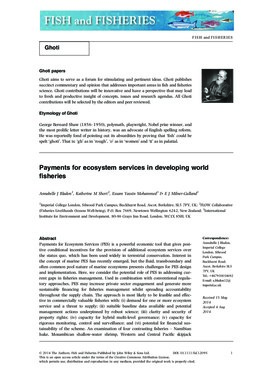Payments for ecosystem services in developing world fisheries

Payments for Ecosystem Services (PES) is a powerful economic tool that gives positive conditional incentives for the provision of additional ecosystem services over the status quo, which has been used widely in terrestrial conservation. Interest in the concept of marine PES has recently emerged, but the fluid, transboundary and often common pool nature of marine ecosystems presents challenges for PES design and implementation. Here, we consider the potential role of PES in addressing current gaps in fisheries management. Used in combination with conventional regulatory approaches, PES may increase private sector engagement and generate more sustainable financing for fisheries management whilst spreading accountability throughout the supply chain. The approach is most likely to be feasible and effective in commercially valuable fisheries with: (i) demand for one or more ecosystem service and a threat to supply; (ii) suitable baseline data available and potential management actions underpinned by robust science; (iii) clarity and security of property rights; (iv) capacity for hybrid multi-level governance; (v) capacity for rigorous monitoring, control and surveillance; and (vi) potential for financial sustainability of the scheme. An examination of four contrasting fisheries – Namibian hake, Mozambican shallow-water shrimp, Western and Central Pacific skipjack tuna and Bangladesh hilsa – demonstrates that a developing world fishery will rarely fulfil each of these preconditions a priori, but that the potential for successful application of PES still exists. In practice, PES design will depend on the institutional context and equire creative and innovative approaches to the maintenance of conditionality and additionality.